September 19th 2006: A few lines scribbled on a couple of my diary pages speak to the nervousness of this period, and to a giant step soon to be taken. At 2pm, in a Sinn Féin office on the Falls Road, I recorded an interview on policing with Gerry Kelly and, afterwards, logged a conversation with press officer Mark McLernon. He told me that Kelly would call me at home at 06.30 the following morning before I sent my news copy to the Belfast Telegraph. Policing was an issue on which Sinn Féin had to measure its words - choose them carefully, and I wanted to be certain - as I am sure he did - that I had correctly understood the context in which he had set his comments. A historic decision by Sinn Féin to participate in policing could come within weeks of a time frame being agreed for the transfer of policing and justice powers from London to local politicians. And, in this context, Sinn Féin’s participation would be “full-bodied” - not “half-hearted”. Kelly told me the interview would “cause a little ruction”.
On September 20th it was front page news and, inside, his words were given plenty of space in which to breathe. The headline on the newspaper’s editorial on the 21st captured the significance of what had been said: Sinn Féin prepares for seismic shift.
In the way that the IRA needed the influence of Brian Keenan to carry the weights of decommissioning, this issue of policing would demand similar attention - with not just Keenan but other significant IRA figures involved. I have another diary note from October 9th 2006, in which a source described the Belfast republican Bobby Storey as the “political voice of the Army” - meaning of the IRA - doing meetings in areas where there are problems. Twenty-four hours later, on the eve of significant political negotiations, I watched one of those republican set pieces; Gerry Adams conducting the orchestra inside the Europa Hotel on a night when I watched the body language and listened for the mood music. The headline on my news report the next day - October 11th 2006 - read: In hotel regularly blitzed by IRA, republicans prepare to do a deal.
I quoted a senior police source, who predicted that if the DUP did the deal on power sharing, then the ‘Shinners’ would do the deal on policing. By now, the path to a Paisley-McGuinness partnership in government was becoming more obvious. The IRA would meet in a ‘Convention’ before the Sinn Féin Ard Fheis vote in late January 2007. And inside the British intelligence community, that vote for policing is described as the “landmark event” - the “pivotal moment” in the new approach of the Provisional Movement; a confirmation that the war was over.
There were, and still are, complicated, divisive issues to be resolved: The presence and role of MI5 in ‘national security’, housed in a headquarters at Palace Barracks in Holywood. Those offices have been developed over a period of near 20 years, likened to the building of a air raid shelter after the war is over. And there are questions relating to an unanswered Past and that conflict graveyard. How do you build new policing on that battlefield?
Paisley and McGuinness entered government in May 2007, but like everything in this process, the time frame for that transfer of policing and justice powers was stretched like elastic - to an almost breaking point in Stormont politics. The DUP slowed things; made a number of demands and not just those relating to republican support for the PSNI and participation on the Policing Board and in District Partnerships. They wanted the issue of contested parades resolved (on their terms) - plus a public statement standing down the IRA army council. This was the next impossible demand; a stalling tactic - deliberately designed as such, something that took us into 2010.
Chief Constables Sir Ronnie Flanagan and Sir Hugh Orde were important leaders in the long period of change. Flanagan delivered the RUC into the new beginning, and Orde’s task was implementing the many reforms of the 1999 Patten Report. At one point, mischievously, I guess, he had offered to address the Sinn Féin Special Ard Fheis on policing. It was too soon for that and, at times, new policing, like the new politics and the new peace still struggles. So, there is an argument, I believe, for a rebeginning or a reimagining of policing; a need to revisit this issue and to look at what has been achieved and what needs more work. This is something on which a number of contributors to this archive project have shared some thoughts.
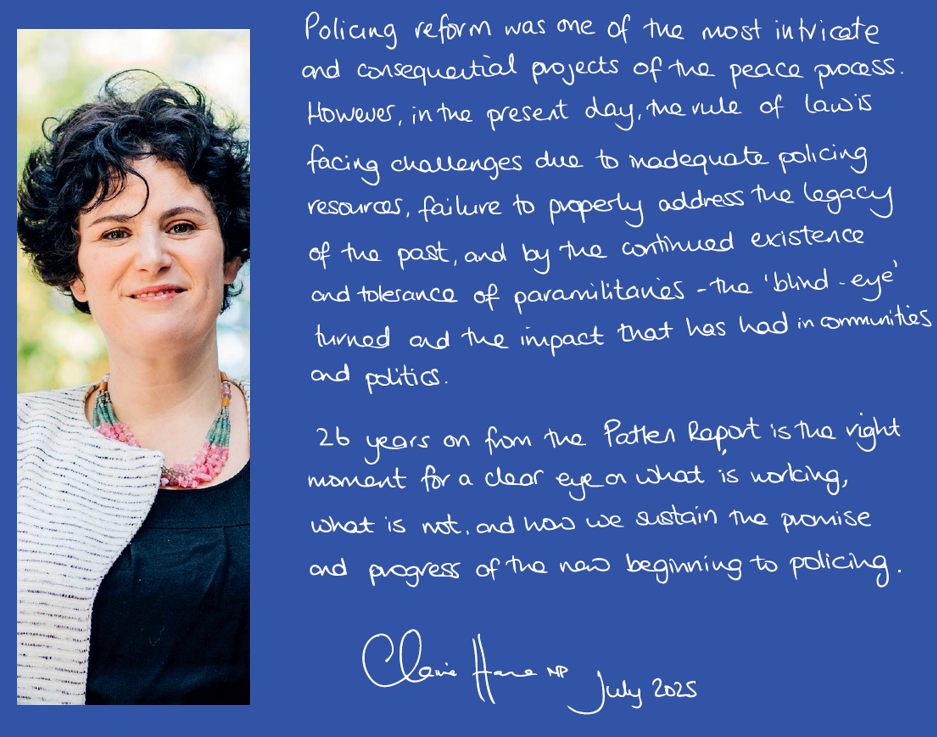 Long before Sinn Féin, the SDLP took steps inside the Policing Board - there from November 2001 at the outset of the 'new beginning'. But what is today's snapshot assessment of the project and process - a question I put to party leader Claire Hanna MP.
Long before Sinn Féin, the SDLP took steps inside the Policing Board - there from November 2001 at the outset of the 'new beginning'. But what is today's snapshot assessment of the project and process - a question I put to party leader Claire Hanna MP.
Text transcript
Policing reform was one of the most intricate and consequential projects of the peace process. However, in the present day, the rule of law is facing challenges due to inadequate policing resources, failure to properly address the legacy of the past, and by the continued existence and tolerance of paramilitaries - the 'blind-eye' turned and the impact that has had in communities and politics.
26 years on from the Patten Report is the right moment for a clear eye on what is working, what is not, and how we sustain the promise and progress of the new beginning to policing.
Claire Hanna MP July 2025
New beginning or a false dawn?
When you listen in on the policing conversation, you hear the frustration; the talk of a political class who look to the police to referee the most contentious of issues. How the failure to address legacy is still a barrier to full political support, and how lack of funding has slowed the physical transition to demilitarise police buildings and vehicles.
In 2025, police officers feel burnt out, disillusioned and undervalued. If you listen, there is a reminder that in his report on reforms, more than 25 years ago, Chris Patten pointed out that policing means more than just the police. It is about how you depoliticise policing in a place where politics can't help itself. A place that still fights with its past and about other issues including parades. Representativeness is still framed by religion.
A senior officer shared this thought: “If a society wishes to rely on policing to referee their disputes, absorb financial cut after financial cut, deal with a past bigger than us all, and manage all the new threats that every society faces, then they will end up with a tired, overstretched service full of people trying to do their best in impossible circumstances.”
It is within this thought that the new beginning has perhaps started to look like a false dawn, and it is why I argue for a rebeginning.
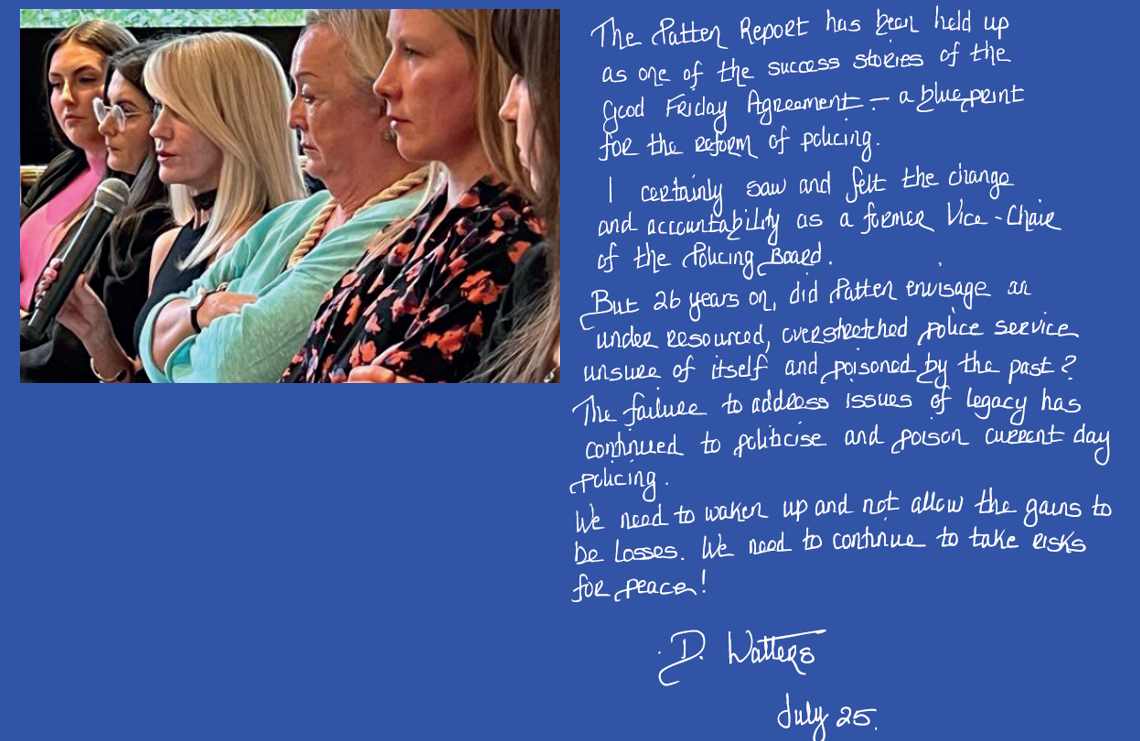 Words of Debbie Watters, a former vice chair of the Policing Board, and a photograph of her speaking at one of our archive events in 2023.
Words of Debbie Watters, a former vice chair of the Policing Board, and a photograph of her speaking at one of our archive events in 2023.
Text transcript
The Patten Report has been held up as one of the success stories of the Good Friday Agreement - a blueprint for the reform of policing.
I certainly saw and felt the change and accountability as a former Vice-Chair of the Policing Board.
But 26 years on, did Patten envisage an under resourced, overstretched police service unsure of itself and poisoned by the past?
The failure to address issues of legacy has continued to politicise and poison current day policing.
We need to waken up and not allow the gains to be losses. We need to continue to take risks for peace!
D Watters July 2025
Download the archive (PDF, 37MB)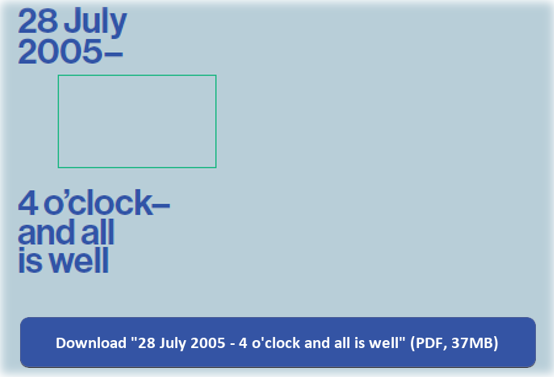

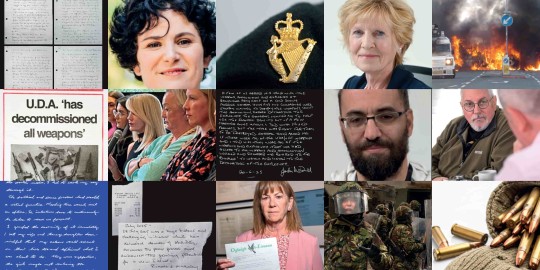
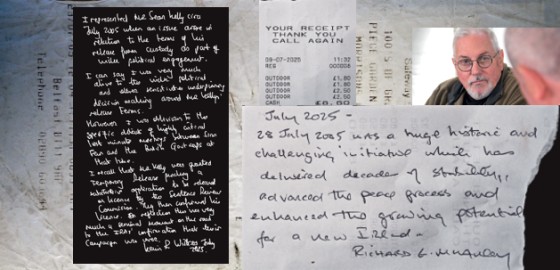
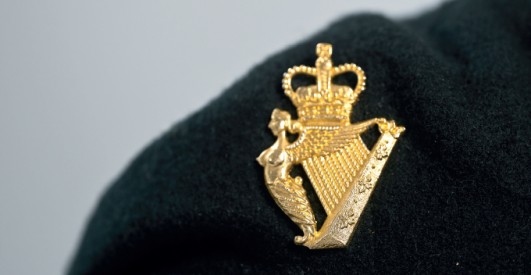
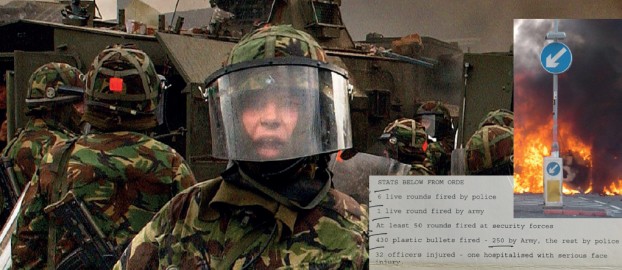
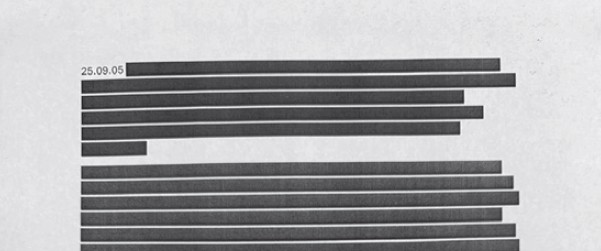
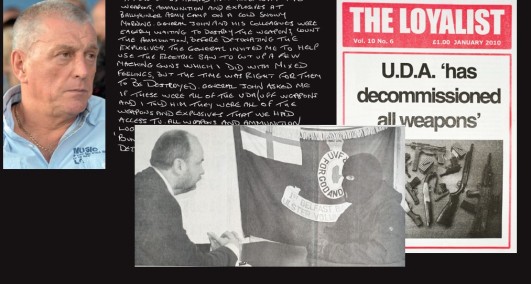
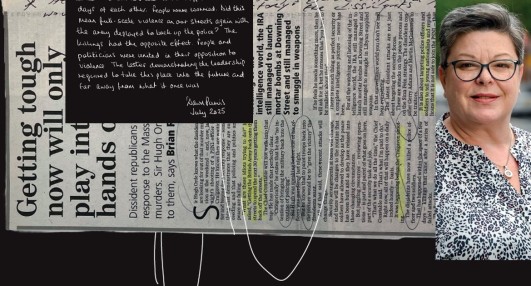
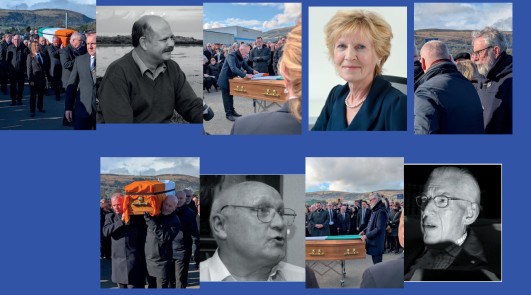
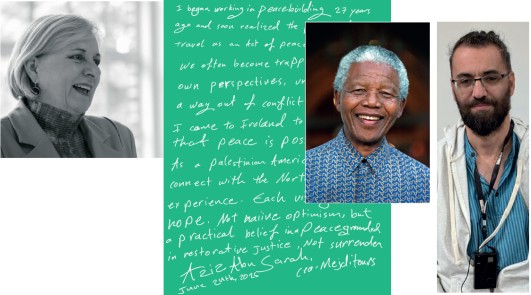

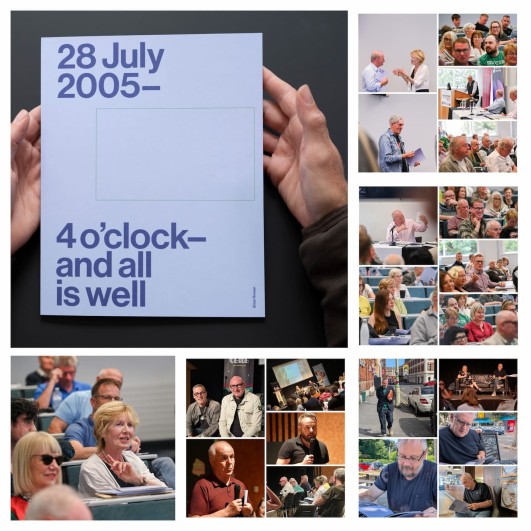

Rate and Review
Rate this article
Review this article
Log into OpenLearn to leave reviews and join in the conversation.
Article reviews